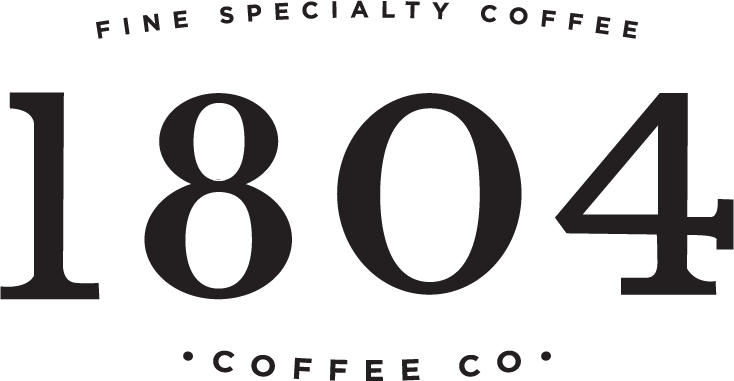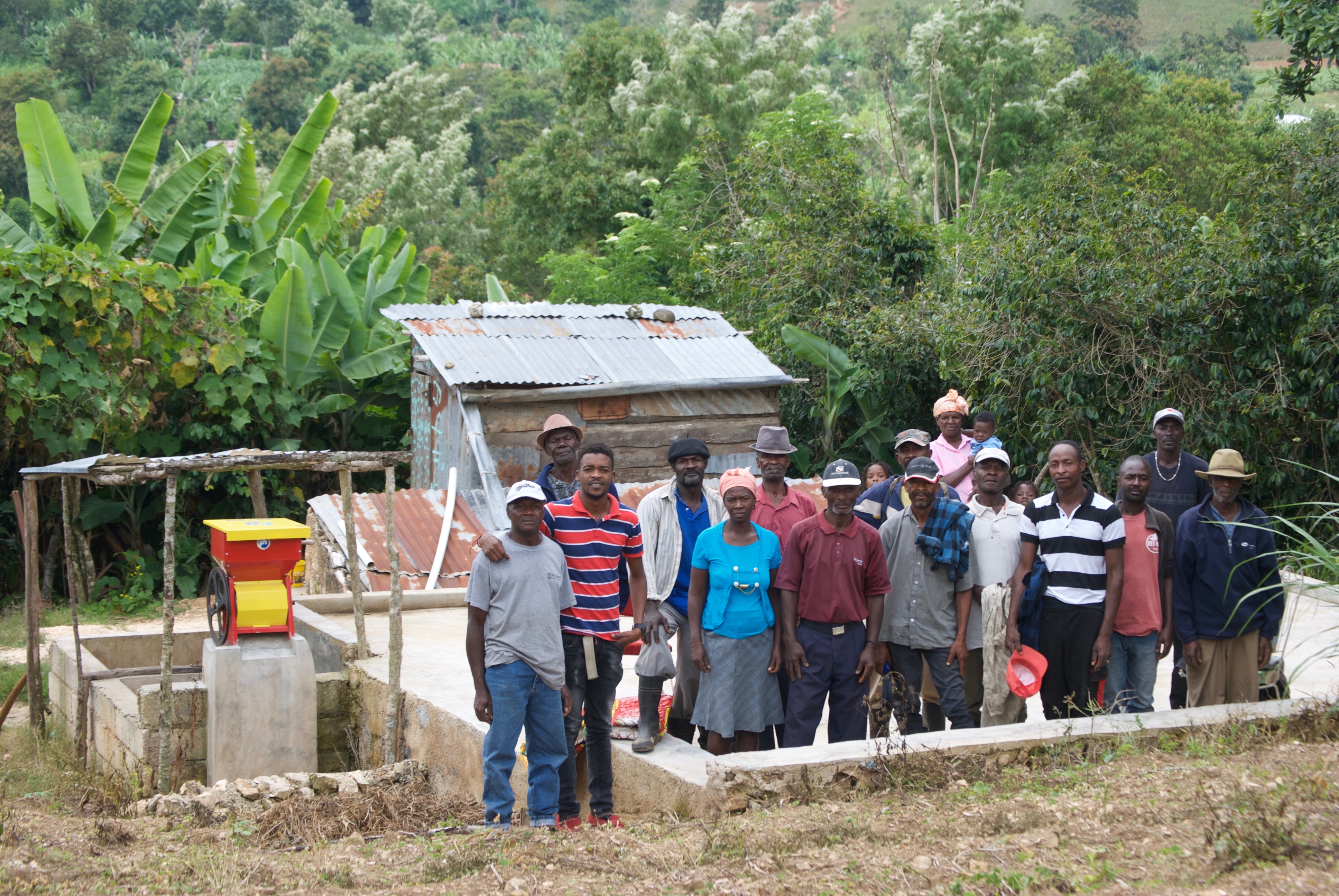Topeca Coffee is partnering with 1804 Coffee to provide you with some of the rarest and finest Arabica Typica coffee you will find this season, and it’s from Haiti. We wonder how many of you have ever had the opportunity to taste high altitude, high quality Haitian specialty coffee, or even if you knew that Haiti grows fantastic coffee.
Haiti has a long and illustrious history growing coffee that dates back to the early 1700s. The heirloom coffee traveled through Martinique and onto Haiti where it is still shade grown in Creole gardens organically after roughly 300 years. Creole gardens consist of layers of plants and trees, such as banana, mango, grapefruit, and avocado which provide shade for the Typica plants as well as contributing natural composting processes. Fertilizers are very expensive, and hard to get in Haiti, by default most farmers still grow coffee organically, just as they have for generations.
Haitian specialty coffee is at the core of their livelihood and culture. The skills and small plot farms are passed down from generation to generation, they are a large part of the fabric of Haitian culture. Haitians drink more coffee per capita than any third world country worldwide, they are true coffee drinkers and can appreciate great coffee.
Their identity is deeply rooted in coffee and the impact Haitian coffee had on early coffee culture. Historically Haitian coffee was coveted by Europeans. Italian roasters used to love to use the low acidity beans in their espresso blends. French, Germans and the Netherlands drank coffee from Haiti for centuries in some of the earliest coffee shops. In fact, Haitian coffee was so popular, Haiti as a colony was worth more to France than America was to Great Britain.
After the Haitians defeated France in the revolution of 1804, they were the first black country to gain their independence in history. France and many countries would not recognize their independence until Haiti paid restitution to France, which was financed through the sale of coffee. By the early 1900s Haiti produced nearly ½ of the world’s coffee supply.
A twenty plus year occupation by American forces in the early 1900s, followed by a string of dictators and export embargos imposed by Europe and the USA crippled their coffee industry. Production dropped by approximately 97% as farmers cut down their plants and trees to make charcoal as well as grow crops they could eat. The deforestation of Haiti has been well documented, its destruction has overwhelmed the climate and terrain of Haiti, and all but eliminated their coffee growing culture.
Yet, because Haitians love to drink coffee, and use dried coffee cherries as a form of currency in the mountains, they retained a small portion of their farms as Creole Gardens. They really had no intention of exporting their coffee, which is what we at 1804 Coffee Company discovered when we began building relationships with farmers several years ago, in search of Haitian specialty coffee.
The mountains of Haiti can be quite enchanting, and certainly there is something very romantic about attempting to lift Haitian farmers from poverty to prosperity through economic development. The idealistic vision of regenerating farms, increasing farmer income and reintroducing the world to a high quality wet processed Haitian coffee is what drives us at 1804 Coffee Co.
But make no mistake about it, this work is grueling, time consuming, and very costly. We have spent years and tens of thousands of dollars traveling across Haiti, building relationships throughout the country with farmers inside the coffee industry, as well as understanding their culture and their needs.
From the inception of 1804 Coffee, we have partnered with Topeca Coffee Roasters. John and his team were gracious to take us under their wing and have been fundamental in educating us on the coffee industry at large while they roasted and packaged all of our coffee for us.
What we learned through this multi year process was that Haitian farmers needed all of our attention. We simply didn’t have time to learn the complexities of the roasting trade nor did we feel like we could truly do these beans justice. Our hands were full with building farmer training programs, and investing our resources into farm regeneration, as well as continuing to forge relationships with quality farmers.
At some point in early spring, over a cup of coffee, John, Ian and I sat around the table and discussed a co-branding project that would see the 1804 Coffee exclusively roasted by and distributed through Topeca Coffee for the 2017 harvest. We felt like it put both companies in their strengths which would provide everyone some excellent and quite unique micro lots from Haiti. It also provides a wonderful platform for us to build on in future harvests.
Today we are proud to announce the first two Haitian coffees that are exclusively available through Topeca Coffee.
Bel Jaden, which means “beautiful garden” in Creole, is an Arabica Typica harvested and blended from three tiny farms at 1,400 meters. These three farms were each less than two hectares.
Mon Kache, which means “hidden mountain” in Creole is a single origin from a five hectare farm nestled in the mountain tops at 1,800 meters.
Both coffees were hand picked from multiple harvest passes over a two month period. These micro lots were wet processed, sun dried and hand sorted.
This year Hurricane Matthew ravaged farms throughout Haiti and those who still had coffee to harvest, noticed a reduction in yields by 90%. Our micro lots are scarce, only yielding 800 pounds of the Bel Jaden and 400 pounds of Mon Kache. The difficult weather conditions though have contributed something unique to the 2017 harvest cupping profile. Topeca Coffee has developed and refined various roast profiles over the past two years of working with these two types of Haitian specialty coffee, unlocking a sophisticated cup profile.
How 1804 Coffee Company treats the farmers we partner with is something everyone can be proud of. We provide monthly training for farmers to improve farming practices and harvest techniques to improve export quality of their Haitian specialty coffee. We have also developed a financial model that blends multiple financial tools to help the farmer regenerate their farms while maintaining their livelihood. We pay above fair trade pricing, provide substantial payment advances, pay a bonus based on the cupping score, and provide farmers with loans for farm regeneration. All of these work together to help farmers meet immediate, short term and long term needs. We forecast that over the next five years 1804 Coffee Company will triple to quadruple farmer income for the farmers working with us.
Our small team at 1804 Coffee is incredibly humbled by the opportunity to partner with Topeca Coffee Roasters, and always proud to represent the Haitian coffee farmer. We hope you will enjoy drinking coffee from our micro lots and sharing these stories with others.
You can place an order for our Haitian specialty coffee, Mon Kache or Bel Jaden here:
https://topecacoffee.com/shop/
Lavi Bon, “life is good”!
Eric English
CEO and Co-Founder 1804 Coffee Company



